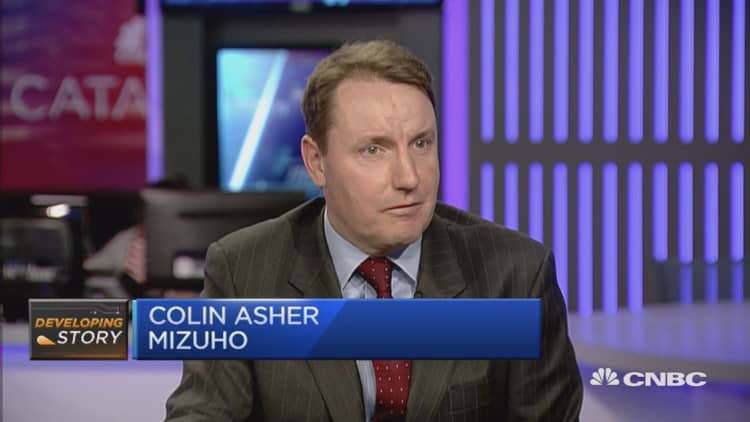
Japan approved a $274 billion stimulus package in fiscal measures Tuesday and left market participants disappointed, according to analysts, with the hitting a three-week high against the dollar.
While the package is aimed at reviving growth in the country's ailing economy, investors just didn't seem impressed with the move.
"I think helicopter money remains off the table for now," Mizuho's senior economist, Colin Asher told CNBC Tuesday. "I think that is one of the reasons there is slight disappointment today. The headline numbers about real spending in the package was 7.5 trillion Japanese yen ($73 billion), slightly above the consensus of 7 trillion Japanese yen. But there doesn't seem to be much additional fiscal and monetary coordination."
As well as the yen rising, there was selling in the Japanese bond market, meaning that investors were concerned that Japan steer away from monetary policy which tends to favor this asset class.
No ‘helicopter money’?
The Bank of Japan (BOJ) announced last week that it plans to review its monetary policy stimulus in September – an announcement that kept expectations for "helicopter money" alive, Helicopter money is a term defined by many banks and analysts as central banks injecting cash directly into the real economy.
Comments made by the BoJ Governor Haruhiko Kuroda on Tuesday had investors confused over the central bank's course of action in September. Speaking to media, Kuroda said that the central bank's planned review will not lead the BoJ weakening its stimulus. He also stressed that the comprehensive assessment of its policy will be conducted in order to achieve the 2 percent inflation target at the earliest possible time.
The central bank in its decision on Friday last week announced a modest rise to its monetary stimulus in the form of an increase in purchases of exchange-traded funds (ETF). The bank also maintained its base money target as well as the pace of purchases for other assets including Japanese government bonds. It also left interest rates unchanged at 0.1 percent. Nonetheless, the announcement of the fiscal package on Tuesday, that has different elements of spending, has investors left disappointed and the currency strengthening.
"What the BoJ did, it did not qualify as a 'bazooka' by markets and the yen strengthened," Nandini Ramakrishnan, global markets strategist at JP Morgan told CNBC via email. "This isn't entirely justified, in that the BOJ did announce certain measures, but the market had its mind set on more."
Ramakrishan told CNBC that she expects the yen to remain at these levels as it has already strengthened in the few days following the BOJ's announcement.
"Using the previous market reactions to BOJ meetings (January, April, and June), this would suggest a range from plus or minus 2 from the current level of 101.7, depending on the upcoming stimulus package," she said.
Fresh funds ‘substantially lower’
The approved fiscal package includes a combination of public-private partnerships for infrastructure spending and cash payouts to low-income earners.
"As expected the total stimulus, (as flagged by Abe) equates to 28.1 trillion Japanese yen," Jeremy Stretch, head of G-10 FX strategy at CIBC Capital Markets told CNBC via email.
"Despite the headline total, the details underline that the fresh funds are substantially lower. The plan includes 13.5 trillion Japanese yen of fiscal measures, including 7.5 trillion yen of new spending starting this year, along with 6 trillion yen of low cost loans."
Stretch added that the immediate market reaction suggests investors are unconvinced that the measures will prove successful, despite Yoshihide Suga, the chief cabinet secretary, arguing they will help stimulate an exit from deflation.
Another analyst told CNBC that the fault lies with policymakers in Japan and not with the central bank itself.
"Whatever the BOJ did/does will have little impact unless the measures are amplified by a concurrent fiscal policy response; we now know the hefty fiscal policy response isn't coming," Christopher Vecchio, a currency strategist at DailyFX told CNBC via email.
"Logically then, knowing that the fiscal policy response is absent, the BOJ likely withheld its 'big bazooka' for a more appropriate time," he added.


